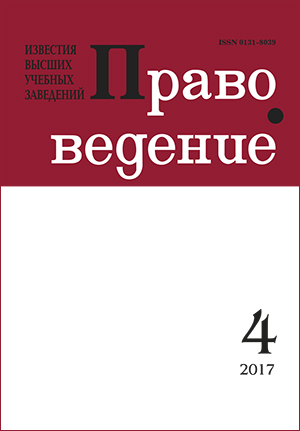Origins of probation in the Russian criminal law science until 1917
Abstract
More than 100 years ago the question arose about the application to the guilty persons of measures having a smaller punitive effect in comparison with imprisonment. Primarily, such persons included those who had committed a minor offence for the first time due to certain life circumstances; the penalty for suh offences consisted of short-term imprisonment. The use of short-term imprisonment in this case led to negative consequences, rather than positive ones. This is due to the fact that the so-called “casual criminals” do not possess stable criminal characteristics typical for persons for whom commission of crimes becomes a profession, and placing them in the prison environment negatively impacts them. Proceeding from this, the idea of probation arose according to which a person was released from punishment on condition that he did not commit a new crime. The study of this institute in the Russian science of criminal law began at the same time when the question of its introduction was considered in many European states. Despite the fact that this institute is not reflected in the national legislation, representatives of the Russian science of criminal law actively examined this measure and proposed their own draft laws on this issue. Within the framework of this study, the author selects and studies the main provisions of the project of the Privy Councilor F. I. Gredinger and the project of the legal scholar S. K. Gogel. In the course of their comparative analysis, various points of view of other authors on various theoretical and practical aspects of application of probation were studied and presented. In addition, a comparison was made between novels and the relevant criminal legislation proposed over 100 years ago since the existence of the USSR to the present day. As a result, the institute of probation received a comprehensive coverage using the historical method. At the same time, conclusions were drawn about the trends in the development of this institute, its positive and negative aspects.
Keywords:
probation, legal nature, grounds for application, grounds for cancellation, trial period, types of punishment, historical analysis
Downloads
References
Downloads
Published
How to Cite
Issue
Section
License
Articles of "Pravovedenie" are open access distributed under the terms of the License Agreement with Saint Petersburg State University, which permits to the authors unrestricted distribution and self-archiving free of charge.




